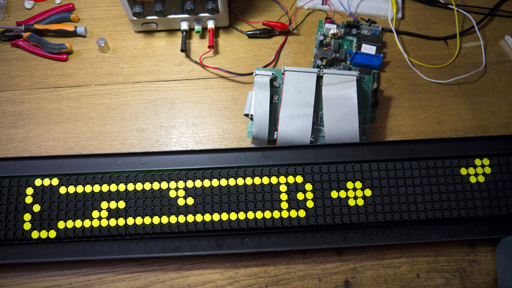Firmware disassembly of a Hanover Displays 84x7 flip-dot display
This display (unknown model code) doesn't use the pixel-by-pixel protocol described in other places. This one is greatly simplified and only allows to use a limited set of ASCII characters.
Drawing custom graphics would require a fontset hack:

RS-485 4800bps TX only, 8 data bits, odd parity, 1 stop bit.
The serial frame must start with two bytes: 0xFF, 0x41. The character count follows, then the ASCII characters with no termination (codes 0x20 to 0x5D are valid), and finally a checksum made of all the previous bytes except $FF XORed together.
For example, to write "ABCD", send:
0xFF 0x41 0x04 0x41 0x42 0x43 0x44 0x41
See comm.py for a simple helper.
The display automatically centers the text and chooses the largest font for a given message. If the message doesn't fit even in the smallest font, it is ignored and the display is cleared.
The fonts aren't monospaced :)
My board has a rotary code wheel with 16 positions to address multiple displays on the same bus. It is completely ignored by this firmware.
The control board uses a Rockwell 6511Q, which is a 6502-based CPU with additionnal instructions and a few mcu-like peripherals.
Memory map:
- $0000~$001F: Peripherals registers
- $0040~$00FF: Internal RAM
- $2000~$2200: External RAM
- $E000~$FFFF: Program code
As with the original 6502, the reset vector is located at $FFFC, the IRQ vector at $FFFE.
See disasm.asm for the RAM map.


